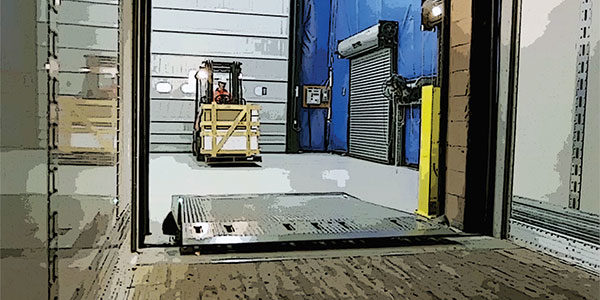A better, safer dock

"Ba-bump, ba-bunk." That was the sound Greg Nicholas, chief operating officer of Citrus Systems Inc., heard all day from his office. It was the sound of lift trucks driving on and off the trailers, which he could hear even though his office was located 150 feet away from the company's loading docks.
The noise was annoying, but worse, it was a sign of a serious problem. The dock levelers were terrible for the lift-truck drivers' backs. The levelers were the old pull-chain style units, with a welded plate in front and a fold-down lip, which created a hump that lift trucks had to drive over. And because Citrus Systems, which makes private-label fruit drinks and other items for the dairy, grocery, and food-service trades, was a busy, growing operation, the drivers were driving over that lip many times each day, causing sore backs for the operators and extra wear on the lift trucks.
There were other issues, too. All the bumping and Joséling caused the shrink-wrap on the top layers of the loads to stretch, especially on the taller loads. That lessened the loads' stability and made them more vulnerable to damage in transit. Furthermore, truck restraints couldn't be mounted on two of the docks, so two out of the four docks had nothing but wheel chocks to restrain trailers.
And there were safety concerns. "We hadn't had any reportable injuries as a result of dock levelers, but we had a couple near misses where someone didn't put a chock in, a truck is slowly moving forward, a manager walks by and sees there's three-quarters of an inch in the lip on the truck and stops the forklift driver and points it out to him," said Nicholas. "We had some trailers shift in the snow. Some little things like this."
BA-BYE, BA-BUMP!In 2013, Citrus Systems moved out of the old warehouse space, which consisted of 68,000 square feet spread over three buildings in Minneapolis. The new location in nearby Hopkins, Minn., consists of a single 135,000-square-foot facility. Yet while the move provided an upgrade in space, nothing much was different where the dock equipment was concerned. Like the previous facility, the new one was outfitted with short, pull-chain type dock levelers.
Determined not to carry over the problems from the old facility into the new one, Citrus Systems decided it was time to invest in new dock equipment—with an eye toward enhancing safety. After a trip to Wisconsin to check out the offerings of different dock-equipment makers, the company purchased equipment from Rite-Hite to fit out the nine dock doors in its new facility.
The equipment included Rite-Hite Hydraulic 4000 levelers with Dok-Commander controls, Corner-Vu safety lights, and Dok-Lok vehicle restraints. Rite-Hite dock seals were installed on some of the doors, while others got Rite-Hite Eliminator-Gapmaster dock shelters.
The new equipment—especially the restraints and levelers—has greatly improved safety, according to Nicholas. For instance, acrylic tube lights bracket the top corners on the inside of each dock opening; these lights turn green when the trailer is locked to indicate that it's safe for forklift operators to enter.
"It's very plain when the dock hook is not engaged and when the truck is not safe (for forklift entry)," said Nicholas.

A safety feature of Citrus Systems' loading dock system: the dock leveler can't lower into place until the trailer hook is engaged. That means lift truck drivers can't drive into the trailer unless the truck is secured to the dock.
As another safeguard, the system is set up to prevent the leveler from being activated until the dock hook is fully engaged. "That's a big advantage for us safety-wise," Nicholas explained. With the old system, employees might be tempted to skip putting wheel chocks out. "It's a Friday, they want to go home, it's the last truck of the day. They're like, 'Oh, I'm only putting four pallets on it. I heard him [the truck driver] put his air brake on,'" he said. The new system "just short-circuits that whole thing completely."
The new dock levelers are lacking one thing, though: "You don't run into the big hump that we used to. It's a smoother transition," said Nicholas. That's "easier on the product loads, easier on the shrink-wrap, and easier on the driver."
The smoother entry has also raised productivity. In the old facility, lift-truck drivers were forced to slow to a crawl to go over the hump. Now, they don't have to do that. "Our turn time on loading a full trailer is probably down to 20 minutes," Nicholas reported. That's partly because of the layout of the new warehouse, but, according to Nicholas, the new levelers were also a significant factor in that productivity gain.
There were money-saving benefits as well.
"I don't know how many pairs of wheel chocks we lost (at the old facility)," Nicholas said. Either (truck operators) would drive over them—they'd forget to take them out and just drive away—or they'd just take them. We would try to chain them up to the wall, (but) we were buying wheel chocks every three months, it seemed like." With the restraints, he says, "Wheel chocks are a thing of the past."
On top of that, maintenance costs have dropped. Citrus Systems signed a maintenance contract, so the equipment gets regular lubrication and care, but nothing has had to be repaired or replaced in the nearly three years it's been in use. That's a big contrast from the older-style levelers; the bumpy transition from dock to truck meant someone was coming in about every six months to re-weld pit frames and end plates that had been loosened, according to Nicholas. "It was a constant issue at the old place."
And there's a side benefit as well. That annoying "ba-bump, ba-bunk" sound? It, too, is a thing of the past.
Related Articles

Copyright ©2024. All Rights ReservedDesign, CMS, Hosting & Web Development :: ePublishing